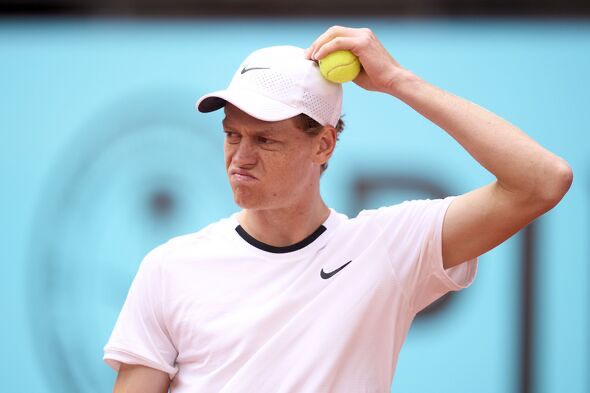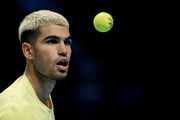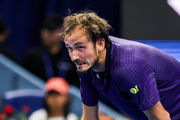

Jannik Sinner‘s doping controversy has come back under the limelight once again. The World Anti-Doping Agency (WADA) on September 28, announced to approach the Court of Arbitration for Sport (CAS) challenging Sinner’s innocence, as ruled by the International Tennis Integrity Agency (ITIA) — the worldwide anti-doping agency for the sport. Sinner himself is “disappointed” with the development. While there has been a flood of opinions on the matter, Sinner got his country mate beside him in this, but not without a dig at the system.
Watch What’s Trending Now!
Italy’s tennis legend Adriano Panatta, a former world No. 4 and the last Italian man to win a singles major before Sinner, emphatically supported Sinner declaring him innocent. Via Italian news outlet. il Fatto Quotidiano, Pan1tta argued that Clostebol, the substance for which Sinner was found positive, is transmitted extremely easily, “just a handshake”. He called it “a mistake, or a carelessness of the physiotherapist.” Despite supporting the ATP No. 1, he brought out a contrasting take on the matter, highlighting the duality of the situation.
Panatta said, “It seems quite clear to me that there is a situation of inequality between those who can afford a pool of top-level lawyers and those who, not possessing significant resources, cannot defend themselves with the same effectiveness. I am told that at certain levels lawyers have high costs. We are talking about hundreds of thousands of euros or even millions. The appeal system is not democratic. I believe in Sinner’s innocence, but I also believe in the right to adequate defense even for those with fewer resources.”
ADVERTISEMENT
The veteran even pointed out the deep-seated pay disparity issue in tennis that has plagued the sport from the core. “The problem is that the top players have incomes that allow them to pay the best lawyers, while there are tennis players on the circuit who struggle to buy a plane ticket,” Panatta stated. Stats do support his argument. Let’s look at some facts for context.
https://twitter.com/giovannipelazzo/status/1840496994097430942?ref_src=twsrc%5Etfw
Both Novak Djokovic and Fernando Verdasco participated in Grand Slams, secured major sponsorships from clothing and sports brands, and competed against Rafael Nadal in famous 5-set epics at the Australian Open in 2009 and 2012. But Djokovic performed better, and the rankings bore the results. While he was sitting atop the tennis rankings, Verdasco was outside the top 30. But that reflected exponentially in their wallets.
ADVERTISEMENT
In the year 2014, Djokovic’s prize earnings were over $7 million, while Verdasco won closer to $700,000, according to Berkeley Economic Review. That is a staggering 1000% gap! You can imagine what the difference between the first and the 100th-ranked player might look like. One significant reason for such a sorry state of affairs is the lack of a unified governing body in tennis.
In contrast to NBA, NFL, and MLB, in tennis the four Grand Slams govern themselves, the International Tennis Federation manages the Olympics and Davis Cup, and the Association of Tennis Professionals (ATP) manages all other tournaments. The consequences are disastrous.
ADVERTISEMENT
Tennis players receive a mere 17.5% of the $2.2 billion in revenue that the sport generates annually. No wonder that lower-ranked players might struggle to make a living. Take world No.195 Noah Rubin for instance. Rubin made approximately $199,000 in 2019. The figure does not look too bad. But, after paying for taxes, travel, and equipment, Rubin is left with about $60,000. For context, the median household income in the US was higher at $68,703 that year.
While Panatta’s tweet pointed out the perpetual financial advantage Sinner is getting, according to many in the circuit, Sinner has received other favorable treatment as well for being the top player.
ADVERTISEMENT
ITIA’s treatment partial to Jannik Sinner?
As soon as athletes test positive for a performance-enhancing drug, they are subject to a provisional suspension while an investigation takes place. Sinner received a provisional suspension following both positive tests for clostebol (The first was an in-competition test on March 10 at the BNP Paribas Open held in Indian Wells, California. The second was an out-of-competition test on March 18).
But athletes can appeal these suspensions. In Sinner’s case, separate tribunals convened by the ITIA heard those appeals quickly and accepted his explanation. sinner had stated that the substance got into his body from a healing spray purchased by his physio, Umberto Ferrara. Sinner’s physiotherapist, Giacomo Naldi had used the spray on a cut on his hand. Sinner backed up his claim with testimony from his support team and receipts, showing that his trainer had indeed purchased the healing spray.
Top Stories
Carlos Alcaraz Makes Bold Coaching Call After Sudden Split With Juan Carlos Ferrero

Stan Wawrinka Breaks Silence on Retirement With Emotional Message After 23 Years on Tour

12-Year Ban Sends Shockwaves Through Chinese Tennis After Match-Fixing Scandal

Daniil Medvedev Brutally Defeated by World No. 524

Ben Shelton & Taylor Fritz Confirm Participation for 2026 Event in a Bid to End Career Long Curse

Those decisions allowed Sinner to keep playing. But the quickness with which the appeals were resolved, raised many eyebrows. It often takes months for players to have such appeals heard. But for Sinner, those were done within weeks. Therefore, he didn’t have to miss any tournaments.
ADVERTISEMENT
“Different rules for different players,” Canadian Tennis player Denis Shapovalov had tweeted after news of the positive tests came out. Shapovalov later clarified that his comment was not against Sinner but against the procedures that did not play out equally for other players and the quick attention that those players did not get as opposed to Sinner. British player Tara Moore is a classic example.
She was charged with an anti-doping violation later shown to be caused by contamination. That took far longer to get resolved. The Briton slammed the ITIA and tweeted, “The @ptpaplayers is trying to figure out a way to work with the players on these cases. The ITIA need to have a precise, monotonous process for each case. They don’t and WADA would have looked incompetent if they didn’t pull it up. This is not the fault of Jannik. This is on ITIA.”
But amid all these arguments and counter-arguments, one thing is certain. Jannik Sinner is still very much in his game. In the ongoing China Open, he just set up a blockbuster final against Carlos Alcaraz. Don’t you forget, Sinner is on a 15-match winning streak. One more win might be all he will look for as he navigates a difficult phase in the prime of his career.
ADVERTISEMENT
ADVERTISEMENT
ADVERTISEMENT
ADVERTISEMENT

